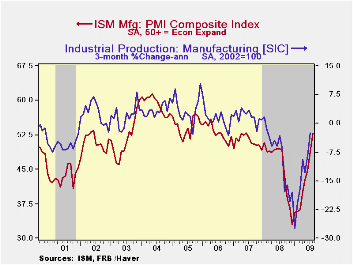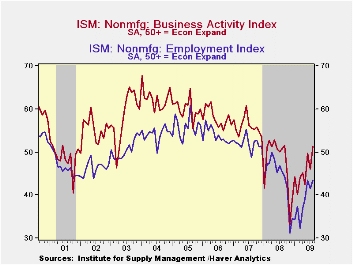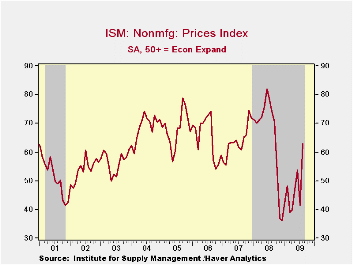 Global| Sep 03 2009
Global| Sep 03 2009U.S. ISM Nonmanufacturing Index Improves While Prices Jump
by:Tom Moeller
|in:Economy in Brief
Summary
Improvement in service sector activity regained its legs last month. The Composite Index for the nonmanufacturing sector from the Institute for Supply Management (ISM) rose to 48.4 last month after having slipped to 46.4 during July. [...]
 Improvement
in service sector activity regained its legs last month. The Composite
Index for the nonmanufacturing sector from the Institute for Supply
Management (ISM) rose to 48.4 last month after having slipped to 46.4
during July. The latest level was the highest since September of last
year and the figure about matched Consensus expectations for a reading
of 48.0. A level of the ISM index below 50 indicates declining
activity. Since the series' inception in 1997 there has been a 65%
correlation between the level of the business activity index in the
nonmanufacturing sector and the Q/Q change in real GDP for the services
and the construction sectors.
Improvement
in service sector activity regained its legs last month. The Composite
Index for the nonmanufacturing sector from the Institute for Supply
Management (ISM) rose to 48.4 last month after having slipped to 46.4
during July. The latest level was the highest since September of last
year and the figure about matched Consensus expectations for a reading
of 48.0. A level of the ISM index below 50 indicates declining
activity. Since the series' inception in 1997 there has been a 65%
correlation between the level of the business activity index in the
nonmanufacturing sector and the Q/Q change in real GDP for the services
and the construction sectors.
ISM surveys more than 370 purchasing
managers in more than 62 industries including law firms, hospitals,
government and retailers.  The nonmanufacturing survey dates back to
July 1997. The figures are available in Haver's USECON database.
The nonmanufacturing survey dates back to
July 1997. The figures are available in Haver's USECON database.
The improvement in the August index was broad-based amongst the component series. The business activity index for the service sector broached the break-even level for the first time since last September with a rise to 51.3. The new orders series neared that break-even level with an increase to 49.9, up from November's low of 35.6. Finally, the employment index rose to 43.5 and that was the highest level since September. Since the series' inception in 1997 there has been a 56% correlation between the level of the ISM nonmanufacturing employment index and the m/m change in payroll employment in the service-producing plus the construction industries.
The rise in service sector
activity powered a sharp improvement in pricing power. The 21.8 point
m/m jump in the price index to 63.1 placed the index at its
highest level since last September. Twenty-three percent of firms
reported higher prices while a significantly reduced 6%
reporting lower prices. Since its inception ten years ago, there has
been a 60% correlation between the price index and the q/q change in
the GDP services chain price index.
Since its inception ten years ago, there has
been a 60% correlation between the price index and the q/q change in
the GDP services chain price index.
Beginning with the January 2008 Nonmanufacturing Report On Business ®, the composite index is calculated as an indicator of the overall economic condition for the non-manufacturing sector. It is a composite index based on the diffusion indices of four of the indicators (business activity, new orders, employment and supplier deliveries) with equal weights. The latest report from the ISM can be found here.
Changes in the Use of Electronic Means of Payment: 1995-2007 also from the Federal Reserve Bank of Philadelphia is available here.
| ISM Nonmanufacturing Survey | August | July | August '08 | 2008 | 2007 | 2006 |
|---|---|---|---|---|---|---|
| Composite Index | 48.4 | 46.4 | 50.4 | 47.4 | 53.5 | 55.7 |
| Business Activity | 51.3 | 46.1 | 50.8 | 47.4 | 56.0 | 58.0 |
| Employment | 43.5 | 41.5 | 45.6 | 43.8 | 52.0 | 53.8 |
| Prices Index | 63.1 | 41.3 | 74.1 | 66.0 | 63.8 | 65.3 |
Tom Moeller
AuthorMore in Author Profile »Prior to joining Haver Analytics in 2000, Mr. Moeller worked as the Economist at Chancellor Capital Management from 1985 to 1999. There, he developed comprehensive economic forecasts and interpreted economic data for equity and fixed income portfolio managers. Also at Chancellor, Mr. Moeller worked as an equity analyst and was responsible for researching and rating companies in the economically sensitive automobile and housing industries for investment in Chancellor’s equity portfolio. Prior to joining Chancellor, Mr. Moeller was an Economist at Citibank from 1979 to 1984. He also analyzed pricing behavior in the metals industry for the Council on Wage and Price Stability in Washington, D.C. In 1999, Mr. Moeller received the award for most accurate forecast from the Forecasters' Club of New York. From 1990 to 1992 he was President of the New York Association for Business Economists. Mr. Moeller earned an M.B.A. in Finance from Fordham University, where he graduated in 1987. He holds a Bachelor of Arts in Economics from George Washington University.
More Economy in Brief
 Global| Feb 05 2026
Global| Feb 05 2026Charts of the Week: Balanced Policy, Resilient Data and AI Narratives
by:Andrew Cates






